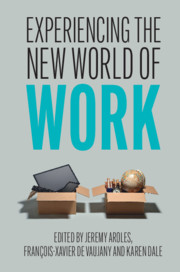Book contents
- Experiencing the New World of Work
- Experiencing the New World of Work
- Copyright page
- Contents
- Tables
- Contributors
- Foreword
- Introduction
- Part I Experiencing at Work
- Part II Digital Platforms and the New World of Work
- Part III Politics, Imaginaries and Others in the New World of Work
- 8 Bypassing the Stage of Copper Wire?
- 9 Critical Theory and the Post-work Imaginary
- 10 Exploring the New in Politics at Work
- Conclusion
- Afterword
- Index
- References
10 - Exploring the New in Politics at Work
A Temporal Approach of Managerial Agencies
from Part III - Politics, Imaginaries and Others in the New World of Work
Published online by Cambridge University Press: 24 December 2020
- Experiencing the New World of Work
- Experiencing the New World of Work
- Copyright page
- Contents
- Tables
- Contributors
- Foreword
- Introduction
- Part I Experiencing at Work
- Part II Digital Platforms and the New World of Work
- Part III Politics, Imaginaries and Others in the New World of Work
- 8 Bypassing the Stage of Copper Wire?
- 9 Critical Theory and the Post-work Imaginary
- 10 Exploring the New in Politics at Work
- Conclusion
- Afterword
- Index
- References
Summary
In this essay, we contend that new ways of working imply a crisis both of communities and politics in our societies. We introduce the concept of 'co-politicisation' to make sense of the potential highly transformative political power of managerial agency in society. In the context of ongoing work transformations, managerial agency increasingly seems to become a political agency, through its potential to transform society and the sense of togetherness. However, in the meantime, politics has entered into crisis. Each of us has the possibility to express their own, individual voice, but without building, in turn, any meaningful or resonant collective and community. We argue that a temporal approach is needed to understand such a crisis of community and of the politics. To that end, we introduce Paul Ricoeur (1985)’s thought on a ‘crisis of the present’ that we apply to new ways of working. We conclude by suggesting that new ways of working may be missing practices likely to produce the extra-temporality that managerial agency needs to perform. Without this extra-temporality, the managerial agency of new ways of working just keeps weakening our sense of togetherness.
Keywords
- Type
- Chapter
- Information
- Experiencing the New World of Work , pp. 227 - 252Publisher: Cambridge University PressPrint publication year: 2021

